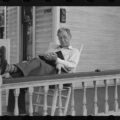Letters in Flight: The Peripatetics of Joseph Roth

Joseph Roth: a Life in Letters
Edited and translated by Michael Hofmann
Hardcover, $39.95
W.W. Norton, 2012
Do not read these letters if you admire the novels of Joseph Roth. Do not read these letters if you hope to learn more about the novels you admire. The readers of his novels evaluate Roth’s art; the readers of his letters appreciate the dramatic life in which they were written: Michael Hofmann’s comprehensive and meticulous collection describe the sacrifice and suffering that ushered Roth’s novels into being. He strove indefatigably for the money and time to write the novels — 21 in 17 years — for which he is best known today (including Job and the cycle The Radetzsky March). Incapable of expressing anything less than the immediate and unvarnished application of his principles, Roth’s struggles as a journalist and novelist, chronicled in this volume, had dire consequences for his personal and professional life.
And what a life it was: ever impecunious and itinerant, Roth was constantly moving, in ever-broader circles — from his birthplace in the Habsburg Empire to Germany, France, Albania, and Russia — and corresponding with, or about, the leading authors and publishers of the inter-war period. He was one of the highest-paid journalists of the mid-1920s, and his letters chronicle that life as a “lemming among lemmings, an unusually farsighted and fearless and bloody-minded lemming, quick to sink his teeth into the flanks of René Schickele or Stefan Zweig or Klaus Mann when they stepped out of line.”
Moses Joseph Roth was born to a middle-class Jewish family in Brody in modern-day Ukraine. He did not know his father, and was raised by his mother within a larger context of the aunts, uncles, and cousins with whom he remained intimate throughout his life. He served in the Hapsburg army during the First World War, in Galicia, and then returned to Vienna as a student of German literature and as a cub journalist after the war. Becoming one of the highest-paid journalists of his day, Roth made his living as a newspaper feuilletonist, writing entertaining literary articles for the enjoyment of the general reader: his vigorous defense of feuilletons as a separate genre (and therefore a separate specialty, requiring a dedicated author) may have contributed to his later difficulties as a correspondent for the Frankfurter Zeitung. In addition to a high-maintenance professional reputation, Roth’s personal correspondence often displays querulous anxiety over the stability of his finances or his principles. Only in Roth’s youth do the letters betray a playful tone, overwhelming a student’s prosaic afternoon in Vienna with an Italian reverie:
Today we are having something cheesy and prosy [for lunch], but the Venetian element in the air today will ennoble and Italianize it, and I will eat nothing cheesy or prosy, but macaroni. And then I really go out on a gondola, past the Ring and the Volksgarten, and I will encounter a pretty Venetian girl, and will accost her thus: May I bore you, Signorina? And the pretty Venetian girl will reply in purest Viennese: See if I care. And for all that, I am in Venice today.
In Vienna Roth met his first wife, Friederike Reichler, a delicate and stylish beauty from Leopoldstadt, who would tragically succumb to schizophrenia after only six years of marriage — she was institutionalized for the remainder of both of their lives. Very early in their marriage Roth was worried about her health: “In a fit of mindlessness, I took on the responsibility for a young woman. I need to keep her somewhere, she is frail, and physically not up to a life at my side.” Yet after she had been institutionalized and ceased to recognize him, and he was worried not only about her upkeep but that of his mistress and her two children, he writes, “In my case, love goes through the conscience, the way with others it goes through their stomachs.”
Roth first came to Paris with his wife as an enthralled correspondent for the Frankfurter Zeitung: “I feel at ease with everyone, though we continually misunderstand each other in matters of practicalities, merely because we so delightfully understand each other in matters of nuance.” His love for France kept him returning, after reporting trips to Albania and Russia, despite characteristic disagreements between newspaper and journalist over title and salary (which subsequently inspired some of his most upbeat writing: the travel essays, “In the French Midi,” and Reports from a Parisian Paradise). The encroachment of Nazism led Roth to cut all ties to his German employers and publishers, though he would continue to write in German all his life (he described the audience for German-language writers in exile as “a shriveled arena”). Destitute, divorced, and fresh from another long-term relationship, Roth embarked upon a lecture tour of Eastern Europe with novelist Irmgard Keun at the behest of the PEN club, and then returned to France. There, he received reports of the suicide of author Ernst Toller, who was in exile in New York, and suffered a breakdown. Roth died of complications from alcoholism in May of 1939, at the age of 44.
Inimitable in their urgent tone and pace, Roth’s letters describe the arc of an era, from the beginning of World War One through the beginning of World War Two. After the juvenile letters to his cousins, there are just a few letters from the Roths to a favorite cousin, and then a few of Roth’s to his in-laws concerning the care and maintenance of his wife during her time in the sanatorium — that is all that he wrote to his family. The vast bulk of his correspondence is devoted to employers and sometime-friends at the Frankfurter Zeitung, to his strung-along publishers, to his long-suffering French translator Blanche Gidon, and, up until the last months of his life, to his friend, benefactor, and occasionally literary nemesis Stefan Zweig. It seems a contradiction that despite his great need for freedom, the letters reveal a man particularly dependent upon others — upon his friends for support and money, his editors for work and money, and the cafe society where he wrote and drank for intellectual stimulation and companionship. Roth may have been independent, but he was no introvert: the cost of his alcoholism and the upkeep of his loved ones necessitated continual socialization and career advancement.
Michael Hofmann notes the overwhelming use of the formal “You” (Sie) in Roth’s address, a last formality the writer retained as he aged. Despite his monarchist tendencies and a nearly chivalrous courtesy, the opinions voiced in these letters are plain-spoken to the point of pathos — and the more pathetic, the more plain-spoken. Roth asks for money from every single one of his correspondents, and Zweig was his most substantial supporter in the last years of Roth’s life. Of critical significance are Roth’s early and continuous denouncements of the Third Reich, and his years-long argument with Zweig about its nature and intent. After Hitler’s appointment as chancellor in January 1933, Roth wrote, “It will have become clear to you know that we are heading for a great catastrophe. Quite apart from our personal situations—our literary and material existence has been wrecked — we are headed for a new war. . . Hell reigns.”
Roth brims with remonstrance for his editors, gives professional and literary advice to his colleagues, friends, and reviewers, and slings personal judgments at everyone he comes across. To a novelist reviewing The Radetzky March, he writes, “You still make the huge mistake—have done since you’ve been writing books—of interpreting, of explaining, of being a know-it-all. You over-egg the pudding, you clue the reader in, you betray what is going on in your brain-cum-workshop. . . . You know, I’m a clever dick as well. But I keep it under wraps.”
Michael Hofmann’s translation is instrumental not only in introducing the English-reading audience to the epistolary Roth, but in allowing the idiosyncrasies of Roth’s voice to trumpet forth. Hofmann is the best kind of interlocutor: in addition to clarifying the context of certain letters, the connections between Roth, correspondent, and third parties discussed, and Roth’s use of French versus German, he points out the author’s pet phrases and lends gossipy whispers to what contemporaries said and wrote about Roth’s behavior. The inclusion of some letters from Roth’s correspondents, as well as photographs, illuminate Roth’s relationship with his publishers, readers, and fellow writers.
The translation of Roth’s letters into English hopefully marks the reintroduction of Roth and other inter-war German-language authors to the English-reading American audience. As Roth so volubly demonstrates, he remained in the center of the most accomplished literary, social and political circles of a whirlwind decade, and he is among the prescient few to recognize the gathering maelstrom. This collection constitutes an acutely aware writer’s observations of his own life, the lives of others, and the horrible age that would survive him.
About Jillian Saucier
Jillian C. Saucier is a writer and critic, and an MFA candidate at Boston University.





